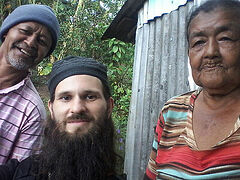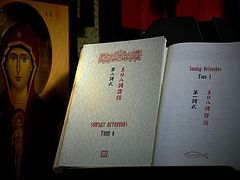As OrthoChristian reported in September, residents of Papua New Guinea have collectively appealed to the head of the Russian Orthodox Church to organize an Orthodox mission in the country. The initiative arose after the visit of Fr. Kirill Shkarbul, the head of the Russian Orthodox representation in Taiwan.
Father said the visit was the most successful of his many mission trips. In his meetings with local residents, about 1,000 Papuans declared their readiness to become Orthodox. In this interview with Russky Mir, Fr. Kirill shares the details of his journey, the prospects for the Orthodox mission in Papua New Guinea, and the development of Orthodoxy in southeast Asia.
“We’ve been waiting for you”
—Please tell us about your trip to Papua New Guinea.
—I was there from January to February. It was a very successful trip. In 2013, we had a successful mission trip to the Philippines, and now there are many parishes and priests there. This experience showed us that such success could be expected in other countries where they know nothing about Orthodoxy. Then came East Timor, where we managed to start a parish. So gradually we turned our gaze to Papua New Guinea, where, according to some priests and tourists I spoke with, there is no Orthodoxy at all. Thus, I began to have the desire to go there.
—How do you begin such large and difficult missions? You just go out on the square…
—Exactly. After landing at the airport, I went to my hotel. I left my things there and went out for a walk. I had been told about a spot where lots of people gather, so I went out to the square and saw some kind of sectarian sitting there, emotionally talking about his sect through a loudspeaker. There were a lot of people there surrounding him on all sides. It was an unusual sight, and I decided to take a video of it on my phone. As soon as I started recording, the people started to get upset and started shouting angrily. Basically, it turned out that I got the attention of the entire square—what’s with this guy in a cassock? I started carefully walking away towards the stores, and about fifty curious people followed me. I came out the other side and people started asking me questions—who am I and why had I come? I started talking about the purpose of my mission, and immediately several people from the crowd declared that they wanted to follow me, asking what they should do. They were with me then the whole time I was there.
—That sounds a lot like stories from the missionaries of antiquity or the Middle Ages…
—You know, I felt like I had come at just the right moment, when the need for an Orthodox mission had ripened in this land. And the people received it. Some even said they had been waiting for me, and finally I’d arrived. Everything went just as well the rest of the time I was there—my new friends brought their relatives, they helped me speak more understandably with their compatriots, and they translated some prayers and brochures. Some of the local preachers started to get interested in Orthodoxy.
—What are the prospects there?
—Papua New Guinea was included in the Russian Orthodox Church’s Southeast Asian Exarchate, which gives us great prospects. Local realities show us that the population there has not yet taken root in any other faiths. Europeans arrived there relatively recently, in the late-nineteenth century. Now there are basically various sects there—Protestants and pseudo-Protestants, and also Catholics. A small part of the population still adheres to ancient beliefs. Those who chose Christianity are still very “raw;” they don’t have a centuries-old tradition, and you could say these people are searching. A mass conversion is possible there.
Already on the first trip, we went to visit this one clan that unites several villages, and the entire local population expressed the desire to become Orthodox, because they were disappointed with Catholicism. I’ve never seen anything like it before. There are huge prospects for the mission in Papua New Guinea, we just have to do the work. The people there are interested, they’re thinking about it. They don’t prioritize material things there, like eating delicious foods and living comfortably. They’re on a religious quest. The abundance of various sects and groups that harshly criticize one another has led to the people losing faith and feeling a real religious hunger.
—Do they remember Miklouho-Maclay,1 who went to New Guinea?
—Yes, they know about him and have a good opinion of him. Not long before I arrived, a Russian center was established in his name there, which is quite active. Before I left on my trip, I contacted the founder of the center, a descendant and namesake of the traveler Nikolai Miklouho-Maclay, and he helped a lot.
Trilingual parish
—Tell us about the Orthodox parishes in Taiwan.
—The Russian Church’s main parish in Taiwan is in the capital city of Taipei, and there are parish communities in three other cities. There’s a possibility another community will be organized in another city in the near future. In Taipei and Hsinchu, we have full-fledged church facilities, and in the other two cities we have other accommodations for the services. In Taipei, we have singers and volunteers who help us. It’s a small establishment, and basically everything is based on the parish’s initiative, on the active parishioners. Besides celebrating the services, we also work on translating the services and other Orthodox texts and going on mission trips across Taiwan. We are located in the center of Taipei, renting a room in a large building. There are no permanent churches in Taiwan and there never have been. We’re in discussions now for the mayor to allocate land to build a church, but it’s just in the planning phase for now.
—What is the history of Orthodoxy in Taiwan?
—It was brought here by Orthodox Japanese in 1895, when Taiwan came under Japanese administration for fifty years according to a peace treaty with China. The Japanese sent many educated representatives and specialists in various fields here. Some of them were Orthodox, because there was a strong Orthodox seminary in Tokyo at that time. They started to ask for priests to be sent to Taiwan, and St. Nicholas of Japan sent Fr. Simeon here in 1901, who organized the first Orthodox parish. Our parish was a revival of Fr. Simeon’s parish.
—Besides you, are there other Russian-speaking priests serving in Taiwan?
—Unfortunately not. As for the parishioners, we have a mixed parish in Taipei: One third is Russian-speaking parishioners from Russia, Belarus, Ukraine, and Georgia; another third is English-speakers (mainly Americans); and another third is locals. We have a trilingual parish. We serve in Russian, English, and Chinese. In other cities of Taiwan, our parishioners are mainly Russian speakers.
—Why do Taiwanese convert to Orthodoxy?
—There are various stories, including some unusual ones. One of our parishioners was sitting at home and did a search for the character for “east,” and the search engine gave him hits about the Eastern Orthodox Church. He got interested, started reading and studying about it, and when he found out there’s a church here, he came and accepted Orthodoxy. There are those who are interested in Russia and the Russian language, and through their interest in Russia they come to Orthodoxy. There are those who are married to Orthodox Christians, and they also become parishioners. We give lectures at local universities, and sometimes some students start coming after that. There are two Taiwanese who were Protestants, but after studying Church history, they learned that Protestantism came from Catholicism, so they became Catholics. Going deeper, they learned that the Catholics came from the Orthodox. Now they are preparing to become Orthodox.
From business school to the priesthood
—Do those who want to become Orthodox have to learn Russian?
—Not necessarily. As I said, our services are in three languages. We specifically labored over the translation of the text of the Liturgy so it would be as correct as possible and would sound beautiful. Those who are deeply interested in Orthodoxy eventually start studying Russian so they can read theological books. That is, among our parishioners, there are those who come to Orthodoxy from the Russian language, and not a few who have come to the Russian language from Orthodoxy.
—You said you are working on translations of Church texts in Chinese. Are there any difficulties with findings words and concepts equivalent to Church Slavonic?2
—Of course—this is very difficult work. After Chinese, all European languages, including Russian, English, Greek, and Latin seem like dialects of the same language. Chinese is very different from Indo-European languages, in particular the Slavic languages. There are grammatical problems—some constructions cannot be translated. There are also difficulties with terminology. One woman attended our courses for a whole year and would constantly ask what “sin” means. Even the most basic concept of “sin” doesn’t exist in Chinese. They have a word that is close, meaning something similar to a “criminal offense.” The woman was perplexed—so only criminals sin? I tried to explain, but it wasn’t easy, when a person hasn’t been taught this concept from childhood.
There are such words and concepts at every turn in Church texts. Sometimes we had to come up with new words. Thankfully the Chinese language is flexible. By combining various characters, you can invent new words that native speakers will understand.
—How do people respond to you in your cassock on the streets of Taipei? Or are they already used to it?
—Only our neighbors are used to it, but there are many people in the city. The people just look, giving me surprised and curious glances. Sometimes they’re interested and they come up to me and start a conversation, but the Taiwanese are introverted, somewhat closed people by nature.
—How has the coronavirus pandemic been for Taiwan?
—Everything is like normal here. Some people got sick at the very beginning, but the epidemic was very quickly extinguished. We didn’t have any quarantine. Only some restaurants and hotels were affected. Schools, factories, stores, and churches, including ours, stayed open. The majority of our parishioners continued to come like before. Maybe one or two stopped coming regularly because of the coronavirus.
However, the pandemic has prevented us from visiting the missions in other countries. For example, I was planning to go to Papua New Guinea again after Pascha, but that trip didn’t happen. But there are also pluses—I created three YouTube channels because of the coronavirus. I might not have been able to do it so quickly if not for the pandemic.









